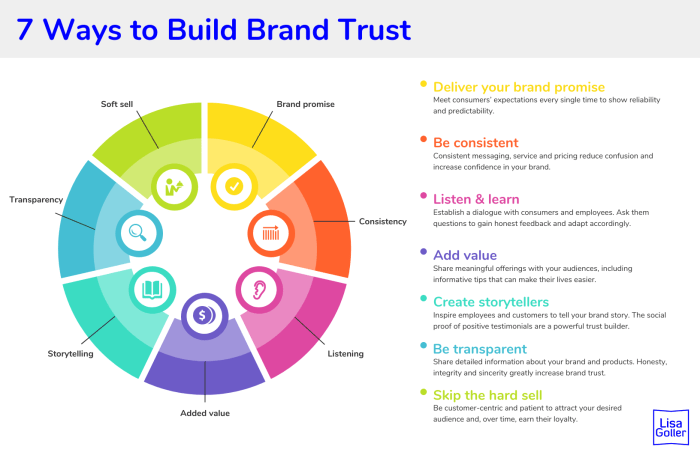In the fast-paced world of international ecommerce, establishing brand trust is the cornerstone of success. From gaining consumer confidence to influencing purchasing decisions, trust plays a pivotal role in the global market. This article delves into the strategies, challenges, and best practices involved in building brand trust across borders.
As we explore the importance of brand trust, strategies for fostering credibility, overcoming cultural barriers, and the role of exceptional customer service, you will gain valuable insights into the world of international ecommerce.
Importance of Brand Trust in International Ecommerce

Building brand trust is essential in international ecommerce as it helps to establish credibility, reliability, and loyalty among consumers in different countries. Trust is the foundation of successful cross-border transactions and can significantly impact a brand’s reputation and competitiveness in the global market.
Examples of Successful Brands Establishing Trust in Global Markets
- Amazon: Amazon has built a strong brand reputation worldwide by offering reliable delivery, excellent customer service, and a wide range of products.
- Apple: Apple’s focus on quality, innovation, and customer experience has earned the trust of consumers in various countries, making it a top choice for tech products.
- Nike: Nike has established trust through its consistent product quality, social responsibility initiatives, and effective marketing campaigns that resonate with global audiences.
How Trust Influences Consumer Behavior in Cross-Border Transactions
Trust plays a crucial role in influencing consumer behavior in international ecommerce. When consumers trust a brand, they are more likely to make repeat purchases, recommend the brand to others, and be willing to pay premium prices for products or services.
Trust also reduces perceived risks associated with cross-border transactions, such as delivery delays, product quality issues, or security concerns, leading to increased conversion rates and higher customer satisfaction.
Strategies for Building Brand Trust

Building trust with international customers is crucial for the success of ecommerce businesses operating in diverse cultural contexts. Here are some effective strategies to establish brand credibility and enhance trust with a global audience:
Consistent Brand Messaging
Consistency in brand messaging across different platforms and communication channels is essential to build trust with international customers. Ensure that your brand values, mission, and promises are clearly communicated and aligned with the expectations of your target audience.
Localized Marketing Campaigns
Tailoring your marketing campaigns to the cultural preferences and nuances of different regions can help establish a deeper connection with international customers. Consider adapting your messaging, imagery, and offers to resonate with the local audience and build trust.
Transparent Pricing and Policies
Being transparent about pricing, shipping costs, return policies, and terms of service can help instill confidence in international customers. Clearly communicate any additional fees or charges upfront to avoid surprises and foster trust in your brand.
Leveraging Social Proof
Customer reviews, testimonials, and social proof can play a significant role in building brand trust. Encourage satisfied customers to share their experiences and feedback to showcase the credibility of your products or services to a global audience.
Trust Signals and Security Measures
Displaying trust signals such as secure payment options, SSL certificates, and verified badges can help reassure international customers about the safety and reliability of your ecommerce platform. Invest in robust security measures to protect customer data and build trust.
Excellent Customer Service
Providing responsive and personalized customer service can go a long way in building trust with international customers. Offer multilingual support, address inquiries promptly, and resolve issues effectively to demonstrate your commitment to customer satisfaction.
Partnerships and Collaborations
Collaborating with reputable brands, influencers, or local businesses in different regions can help enhance your brand’s credibility and reach a wider audience. Strategic partnerships can leverage the trust and reputation of established entities to build trust with international customers.
Overcoming Cultural Barriers
When expanding into international markets, businesses often face cultural barriers that can impact their trust-building efforts in ecommerce. Understanding and adapting to these cultural differences is crucial for successful brand trust establishment.
Common Cultural Barriers
- Different communication styles: Cultural variations in communication can lead to misunderstandings or misinterpretations of branding messages.
- Values and beliefs: Diverse cultural values and beliefs may influence how consumers perceive a brand and its trustworthiness.
- Social norms: What is considered acceptable or appropriate behavior in one culture may differ in another, affecting brand perception.
Adapting Branding and Messaging
- Localization: Tailoring branding and messaging to resonate with specific cultural nuances can help bridge the gap and build trust.
- Language considerations: Ensuring accurate translation and localization of content is essential to avoid misunderstandings and build credibility.
- Cultural sensitivity: Being aware of and respecting cultural differences can help businesses create authentic connections with diverse audiences.
Successful Examples
McDonald’s is a prime example of a brand that has successfully navigated cultural differences to build trust on a global scale. The company adapts its menu offerings to suit local tastes and preferences, while maintaining a consistent brand image worldwide.
Building Trust Through Customer Service
Customer service plays a crucial role in building trust among international customers. It is often the first point of contact for customers and can significantly impact their perception of a brand. Providing exceptional customer service can help businesses foster trust, loyalty, and a positive brand image across borders.
Best Practices for Handling Customer Inquiries and Resolving Issues
- Respond promptly: Timely responses to customer inquiries show that you value their time and concerns.
- Listen actively: Pay attention to customer feedback and address their issues with empathy and understanding.
- Offer solutions: Provide practical solutions to problems and ensure that customers feel supported throughout the process.
- Follow up: After resolving an issue, follow up with customers to ensure their satisfaction and build long-lasting relationships.
The Importance of Multilingual Support and Localized Customer Service
- Language barrier: Offering multilingual support can help bridge the language gap and make customers feel more comfortable interacting with your brand.
- Cultural sensitivity: Localized customer service shows that you understand and respect the cultural differences of your international customers, building trust and credibility.
- 24/7 availability: Providing round-the-clock customer service can help address issues promptly, regardless of time zones, and demonstrate your commitment to customer satisfaction.
Final Summary
In conclusion, building brand trust in international ecommerce is not just a goal, but a necessity for businesses looking to thrive in the global marketplace. By understanding the nuances of different cultures, leveraging social proof, and prioritizing exceptional customer service, brands can establish a strong foundation of trust that transcends borders.
General Inquiries
How can I build trust with international customers?
To build trust with international customers, focus on providing excellent customer service, leveraging social proof, and adapting your messaging to resonate with diverse cultural audiences.
What role does customer service play in building brand trust?
Exceptional customer service is crucial for fostering trust among international customers. It helps in resolving issues promptly and maintaining a positive brand image.
Why is multilingual support important for building trust across borders?
Offering multilingual support shows international customers that you value their business and are committed to providing a seamless experience, ultimately building trust.



